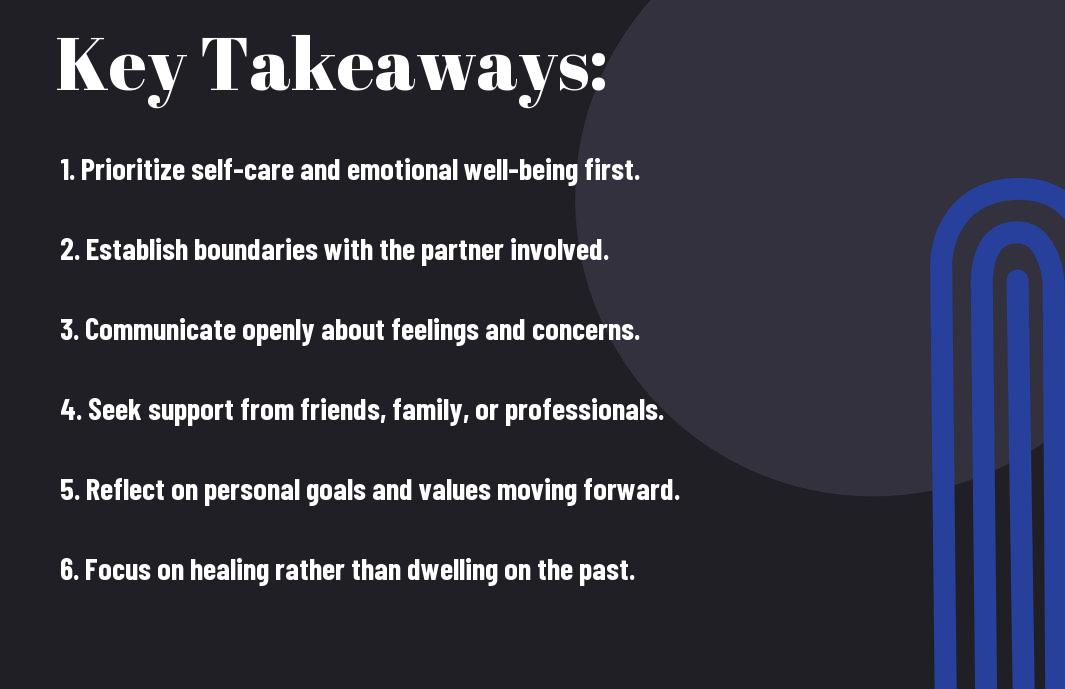Over the course of recovering from an affair, you may feel a whirlwind of emotions that can easily overwhelm you. It’s important to focus on healing and self-discovery during this tumultuous time. As you navigate this challenging journey, you need to cultivate self-compassion and set realistic goals for moving forward. With the right strategies, you can not only rebuild your life but also emerge stronger and more resilient than before. In this post, you’ll find crucial tips and insights to help you navigate this path with confidence and grace.

Key Takeaways:
- Prioritize self-care to nurture your emotional and physical well-being during the recovery process.
- Establish boundaries to protect yourself, allowing space for reflection and healing without unnecessary pressures.
- Seek professional support, such as therapy or counseling, to facilitate processing your emotions and experiences.
- Communicate openly with your partner about feelings, expectations, and the steps needed for rebuilding trust.
- Engage in activities that bring you joy and fulfillment, reinforcing your sense of self outside the relationship.
- Surround yourself with supportive friends and family who can provide encouragement and perspective.
- Focus on personal growth, using this experience as an opportunity for reflection and positive change.

Understanding the Impact of Infidelity
Affairs can leave lasting scars, impacting not just relationships, but your very sense of self. Recognizing how infidelity affects you is necessary for healing and moving forward. It can provoke feelings of betrayal, confusion, and grief, compelling you to confront your own values and beliefs about love and loyalty. Acknowledging these impacts is the first step in your recovery journey.
Emotional Consequences
Understanding the emotional fallout from infidelity is vital for your healing process. It’s natural to experience a whirlwind of emotions, including anger, sadness, and even self-blame. These feelings can significantly affect your mental well-being, leading to anxiety or depression if left unaddressed. Validating your emotions and allowing yourself to grieve the loss of the relationship as you once knew it is an important step toward recovery.
Trust Issues
Across many individuals affected by infidelity, trust issues frequently emerge as a dominant challenge. You may find it hard to trust not only your partner but also yourself. This can hinder future relationships and sap your confidence. Rebuilding trust is a process that requires honest conversations, clear boundaries, and time. It’s necessary to recognize that these trust issues can lead to feelings of isolation, but they also present an opportunity for profound personal growth and understanding of what trust means to you.
In addition, navigating trust issues demands that you engage in open communication and honesty with yourself and others. It challenges you to assess your emotional landscape and determine what is necessary for you to feel secure again. Engaging in self-reflection may enlighten you on what you need from future partners, refining your expectations and boundaries. Taking the time to heal and assess your personal values will improve your ability to form deeper connections, allowing you to move forward without carrying the weight of past betrayals.
Taking Time to Heal
If you’ve experienced the pain of an affair, it’s vital to give yourself the space and time necessary to heal. Rushing the recovery process can lead to unresolved feelings and lingering doubts, hindering your path to a healthier future. Embrace this period as an opportunity for growth and self-discovery, prioritizing your own emotional needs above all else.
Allowing Yourself to Grieve
Between the heartache and the healing, it’s important to acknowledge that grief is a normal and necessary part of the process. Allow yourself to feel and process the emotions associated with the betrayal; this is key to moving forward authentically. Honoring your feelings rather than suppressing them will pave the way for recovery.
The Importance of Self-Reflection
The journey to recovery can be significantly enhanced by taking time for self-reflection. Engaging in this process allows you to understand your feelings, pinpoint what led to the affair, and redefine your personal values and boundaries moving forward.
Allowing yourself to explore your inner thoughts during self-reflection can be a transformative experience. By analyzing your needs and desires, you can develop a clearer picture of what you want in future relationships. This process may involve journaling or quiet meditative time, which can lead to an improved sense of self-awareness and more meaningful connections in the future. Fostering a deep understanding of your emotional landscape promotes both healing and growth on your journey to reclaim your identity.
Building a Support System
Not having a solid support system can make recovery from an affair feel overwhelming. Surround yourself with understanding and empathetic people who can listen without judgment. You might find it helpful to connect with others who have experienced similar situations; check out The people who decided to stay after the infidelity, how do … for valuable insights. Having a network of supportive friends, family, or even online communities can provide the validation and encouragement you need during this challenging time.
Seeking Professional Help
After navigating the initial shock of infidelity, seeking professional help can be beneficial for your emotional recovery. Therapists and counselors can provide you with tailored strategies to understand your feelings, set healthy boundaries, and facilitate healing. Working with a professional ensures that you have a safe space to explore your emotions and receive guidance on rebuilding your sense of self.
Leaning on Friends and Family
For many, friends and family provide necessary emotional support during recovery. Leaning on these trusted individuals can help you express your feelings, share your experiences, and find comfort. They can also encourage you to focus on self-care and remind you of your worth outside of the relationship. The support system you build can play a significant role in your healing journey.
Indeed, having a strong network of friends and family not only provides a safe space to process your emotions, but it also reassures you that you are not alone in this experience. Utilize their support to talk about your feelings, seek advice, or simply spend time together to distract from distressing thoughts. However, be cautious of sharing with those who may judge or take sides, as this could lead to further emotional strain. By fostering positive interactions and open communication with your loved ones, you strengthen your resilience and pave the way for a healthier future.

Establishing Boundaries
Unlike previous experiences where you may have allowed your feelings to be sidelined, establishing clear boundaries is imperative for your healing journey. Setting boundaries will help you regain control over your personal space and emotional well-being, ensuring that you protect yourself from further emotional turmoil. By being assertive about what is acceptable and what is not, you empower yourself to move on without losing your sense of identity.
Communicating Needs Clearly
Against the odds, you must vocalize your needs in a relationship. This means expressing what is acceptable behavior and what makes you uncomfortable. Openly communicating your feelings fosters a transparent environment where both parties understand each other’s limits, allowing for healthier interactions moving forward.
Reassessing Relationships
The process of reassessing relationships is vital for your emotional health. Often, you will find that certain connections no longer serve your best interests. Assessing who adds positivity to your life—and who contributes to your distress—can lead to empowering decisions about whom to keep in your circle. Clearly define the attributes you value in relationships and eliminate those that do not align with your changed perspective post-affair. It’s also a time to acknowledge the impact of the affair on your relationships and seek support from those who truly care and understand your journey toward healing. This evaluation can lead to transformative relationships that lift you up and reinforce your self-worth.
Rediscovering Yourself
Now is the perfect time to focus on reconnecting with your true self after experiencing an affair. This journey of rediscovery involves taking a step back to reflect on who you are beyond the relationship. Embrace the opportunity to explore your passions, values, and dreams, allowing yourself to heal while nurturing your individuality. By placing attention on your personal growth, you position yourself for a healthier and more fulfilling life ahead.
Engaging in Hobbies and Interests
On your path to rediscovery, engaging in hobbies and interests that excite you can be incredibly therapeutic. Whether it’s painting, hiking, or learning a new language, these activities can reignite your passion and joy for life. They allow you to express yourself creatively and foster a sense of community, helping to fill the void left by your past experiences.
Setting Personal Goals
Among the most effective ways to support your recovery is by setting personal goals. This process helps you establish a clear sense of direction, allowing you to focus on achievements that are meaningful to you. With targeted goals in place, you are likely to foster a newfound sense of purpose, ultimately empowering you to rebuild your life.
Indeed, when you prioritize setting personal goals, it opens the door to self-discovery and fulfillment. Start by identifying areas in your life that require attention, whether it’s your career, relationships, or health. Break these down into manageable steps so that you can track your progress and celebrate small victories. These goals can be ambitious or simple, yet each one contributes to your overall personal growth. As you achieve them, you’ll cultivate a stronger sense of self and build resilience, empowering you to move beyond past pain and embrace a brighter future.
Moving Forward in Relationships
Your journey to recovery in relationships involves taking intentional steps to create healthier dynamics. Embrace open communication and mutual understanding, as these elements lay the foundation for rebuilding and moving forward. Engaging in honest conversations about your needs and concerns can foster deeper connections and help both partners grow. While rekindling love and trust may take time, embracing growth and change will ultimately lead to stronger, more resilient relationships.
Rebuilding Trust with a Partner
Beside the inevitable challenges of healing, you need to prioritize rebuilding trust with your partner. This process requires patience and consistent effort from both sides. Engaging in transparent communication, being accountable for your actions, and setting clear boundaries can significantly help restore lost faith. Focus on fostering a safe and supportive environment where both partners can express their feelings without fear of judgment.
Knowing When to Let Go
Behind every relationship, there may come a time when you need to evaluate whether to continue or let go. It’s imperative to assess the emotional health of both you and your partner openly. Ask yourself if the relationship is conducive to your well-being and growth; if it consistently fosters negativity and resentment, it might be time to consider ending it.
Due to the emotional weight of your situation, knowing when to let go can be particularly challenging. You may feel guilt or fear about ending things, but staying in a toxic dynamic can hinder your personal growth. You deserve a relationship that uplifts and nurtures you, rather than drags you down. If you find that your emotional needs consistently go unmet or that unhealthy patterns persist, it’s imperative to take that leap and prioritize your own happiness and well-being.
Conclusion
The journey of recovering from an affair is challenging, but by focusing on self-care, establishing healthy boundaries, and seeking support, you can emerge stronger than before. It’s imperative to prioritize your emotional well-being and to engage in activities that foster personal growth. As you navigate this difficult time, trust yourself to make the right decisions that align with your values and needs. By embracing this process, you can move forward with resilience and a renewed sense of self, paving the way for healthier relationships in the future.
FAQ
Q: What are the first steps to take after discovering an affair?
A: The initial step is to allow yourself to process your feelings. It’s natural to experience a wide range of emotions such as anger, sadness, and confusion. Consider seeking support from trusted friends or a therapist. Journaling your thoughts can also help you clarify your feelings. Taking time before making any major decisions will empower you to approach the situation with a clearer mindset.
Q: How can I avoid losing my sense of identity during the recovery process?
A: It’s vital to prioritize self-care and engage in activities that bring you joy and fulfillment. Dedicate time to hobbies, exercise, or spending time with supportive people who uplift you. Reflect on your values and interests outside of the relationship. Focusing on self-discovery will help you maintain your individuality as you navigate through the recovery process.
Q: Should I consider reconciliation or ending the relationship after an affair?
A: The decision to reconcile or end the relationship is deeply personal and should be based on your feelings and circumstances. Evaluate whether both partners are willing to address the underlying issues that led to the affair. Open and honest communication is vital in this discussion. It’s also helpful to consult with a therapist to facilitate the exploration of your options in a constructive manner.
Q: How can I cope with feelings of betrayal and rebuild trust?
A: Coping with feelings of betrayal involves acknowledging your emotions and allowing yourself to grieve the loss of trust. Engage in open dialogue with your partner about your feelings, but set boundaries to protect your emotional well-being. Rebuilding trust takes time, consistency, and transparency from both partners. Consider setting small, achievable goals together that promote healing and trust-building.
Q: What are effective ways to support myself during this emotional journey?
A: Supporting yourself during this time involves creating a personal support system. Surround yourself with friends or family who can listen and provide encouragement. Engaging in mindfulness practices such as meditation or yoga can help reduce stress. Additionally, exploring new interests or returning to old passions can be empowering and help you regain balance and perspective in your life.
